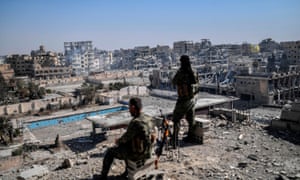Rise and fall of Isis: its dream of a caliphate is over!

For a group with such spectacular ambitions, Islamic State’s last stand took place in surroundings of almost shocking banality: a hospital and sports stadium in Raqqa, the Syrian town that was the political capital of its self-styled caliphate. After weeks of street-to-street battles and bombing, these final strongholds fell to Kurdish fighters last week. More than three years after Isis surged to global infamy with a stunning campaign of conquest, the end came with a whimper, not a bang.
“Once purported as fierce, now pathetic and a lost cause,” Brett McGurk, the US special presidential envoy for coalition forces tweeted. Such triumphant claims have become familiar since the 9/11 attacks. I heard them in Afghanistan in 2002, but US troops are still engaged in the fight against the Taliban. I heard them in Iraq in 2003, 2004, and then year after year until the US pulled out in 2011.
The scepticism with which any talk of “victory” is greeted by analysts and reporters is familiar, too. Many expert observers counselled prudence rather than celebration last week: Raqqa may have fallen, but if Isis is down, it is far from out.
